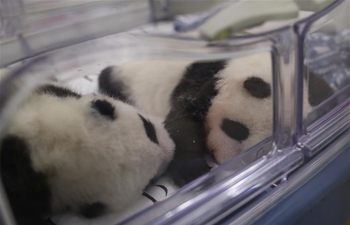JERUSALEM, Oct. 3 (Xinhua) -- Israeli and U.S. researchers found that embryonic stem cells, used for disease treatments and medical researches, may contain cancer mutations, the Hebrew University of Jerusalem (HUJI) reported on Thursday.
Embryonic stem cells, which originate in a few-days-old fertilized eggs, are differentiated into each type of cell in the human body.
In medicine, stem cells are used for various purposes, such as bone marrow and umbilical cord blood transplantations. Many other uses are still under development, such as treatments for diabetes and blindness.
There is also hope that in the future whole organs from stem cells could be created, thus saving the need for organ donation.
However, in laboratory use, stem cells produce tumors in their unaligned form, and may produce tumors if transplanted this way in humans.
A new study, conducted by researchers from HUJI and Harvard University in Cambridge, Massachusetts, and published in the journal Cell Stem Cell, found that the similarity between embryonic stem cells and cancer cells may be even greater than what is considered so far.
The researchers found that stem cells spontaneously collect cancerous mutations previously detected in human tumors.
In contrast to previous studies, which found similarities in whole or part chromosome alterations between stem cells and tumor-derived cells, the new study found recurrent point mutations in more than 20 of them.
That is, cells carrying these mutations that undergo differentiation and are implanted in patients may resemble cancerous tumor cells.
The study included genomic analysis of hundreds of stem cell samples from dozens of labs worldwide.
It was found that about 33 percent of the cells included at least one mutation previously found in human cancerous tumors that appeared during laboratory growth.
Following the study findings, from now on clinical trials in embryonic stem cells may include point mutation analysis prior to use in patients.
In addition, findings discovered in medical studies using stem cells with a cancerous mutation may confound theses studies, as the results obtained do not simulate natural processes, but processes like the disease.

















